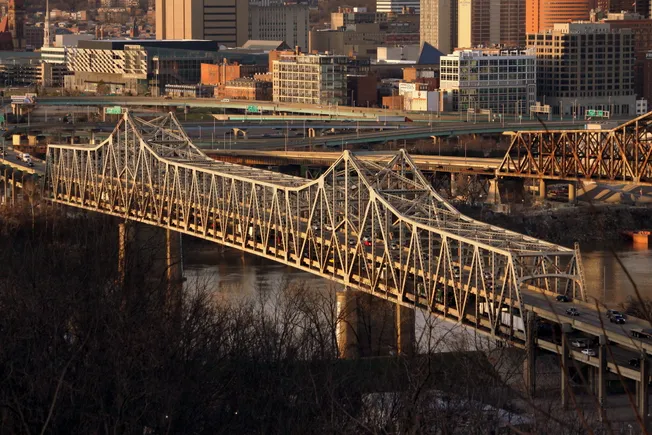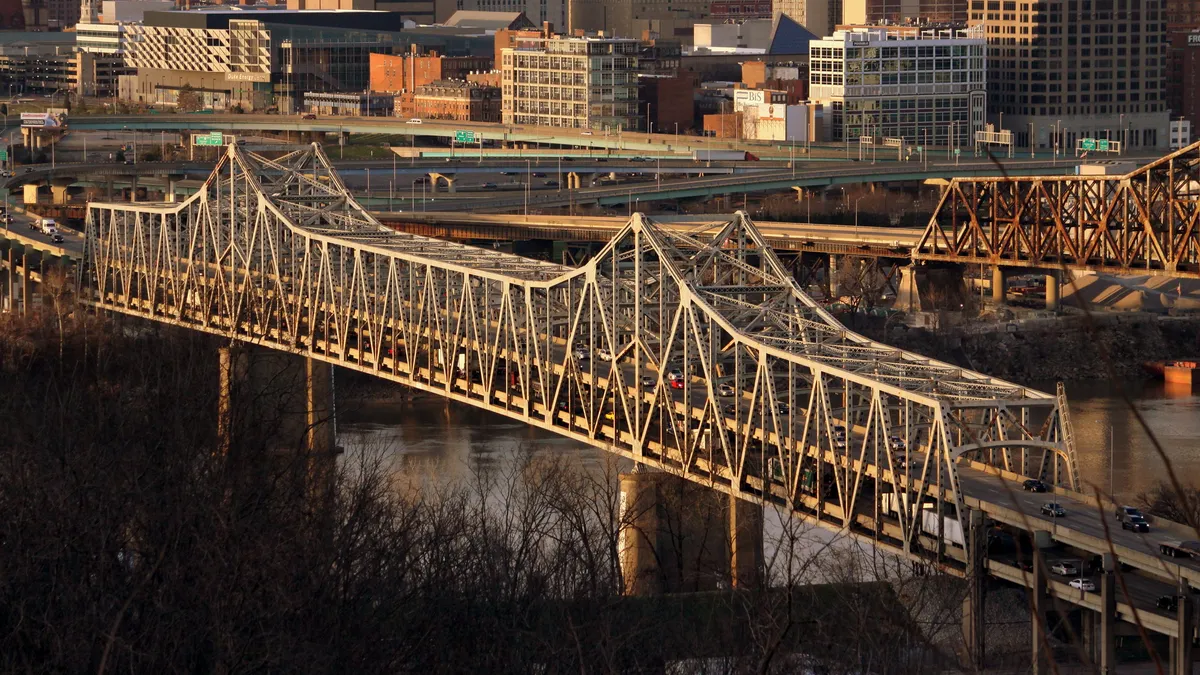$3.6B Brent Spence Bridge project sued over environmental concerns

An article from

Dive Brief
The lawsuit alleges officials didn’t sufficiently study the impact of the new Cincinnati-area span and says the design doesn’t do enough to include biking and transit.

The Brent Spence Bridge spans the Ohio River and connects Cincinnati to Covington, Kentucky.
This audio is auto-generated. Please let us know if you have feedback.
Dive Brief:
- A new federal lawsuit questions the environmental impact of the $3.6 billion Brent Spence Bridge Corridor project connecting Cincinnati and Northern Kentucky.
- Four Cincinnati-area groups filed a 34-page lawsuit on Oct. 16 that names six defendants, including the DOT, the Federal Highway Administration, Transportation Secretary Pete Buttigieg and Ohio and Kentucky transportation officials.
- The suit alleges that transportation officials didn’t sufficiently study the environmental aspects of the project, nor its impact on surrounding communities, which are home to primarily non-White residents. It also says the design doesn’t do enough to include alternative modes to car travel such as walking, biking and transit.
Dive Insight:
The project has become something of a symbol of the federal Infrastructure Investment and Jobs Act. President Joe Biden visited in 2023 and called attention to its status as one of the country’s most congested freight routes and a weak link in the supply chain.
Per the suit, planners completed an environmental assessment and issued a Finding of No Significant Impact in 2012. Planners reaffirmed the FONSI in 2015, 2018 and again in May. In January, they also released a Supplemental Environmental Assessment and then in May, a Revised Supplemental Environmental Assessment, indicating that the agencies did not see the need for more extensive environmental study. However, the RSEA does note that the project will impact wetlands, forest habitat, water quality and more.
Plaintiffs are the Greater Cincinnati Coalition for Transit and Sustainable Development, Civic Cincinnati, Ride the Cov and Queen City Bike, all groups that promote environmentally friendly alternatives to car travel. The groups say that the project approval is unlawful because its impacts were not sufficiently studied and mitigated.
“By refusing to acknowledge that the Project will have significant impacts on the human environment, Defendants have arbitrarily and capriciously refused to prepare an EIS, which would require them to meaningfully consider reasonable alternatives,” the suit said, such as greater investment in transit and charging tolls to reduce demand.
In response, Kentucky Transportation Secretary Jim Gray, one of the defendants, said in an email, “A priority of the Brent Spence Bridge Corridor Project is to provide an inclusive process that enhances surrounding communities while delivering a project that will bring safer, less congested travel and job opportunities to the region. We are aware of the filing against federal and state agencies. No further details can be shared at this time due to pending litigation.”
Other parties named in the suit either did not respond to Construction Dive’s request for comment or declined due to pending litigation.
A massive project
The Brent Spence Bridge is an eight-lane double-deck span carrying I-71 and I-75 as well as local traffic over the Ohio River between Cincinnati and Covington, Kentucky. The project entails building a 10-lane companion bridge and rehabilitating the existing one. The new bridge will carry I-71 and I-75 traffic, and local drivers will use the existing span, which will be reduced to six lanes.
The project was approved in 2022 with a $1.6 billion grant from the IIJA, and construction is scheduled to start early next year. Other costs will be split by Ohio and Kentucky, with each paying for the approach work in their respective states, according to the project website.
A joint venture of Chicago-based Walsh Construction and Westerville, Ohio-headquartered Kokosing Construction is set to build the new span, while Dallas-based Jacobs will provide design and engineering services. AECOM, also based in Dallas, is the lead designer.
It will be built in phases and is scheduled to be complete by 2032, per the project website.




